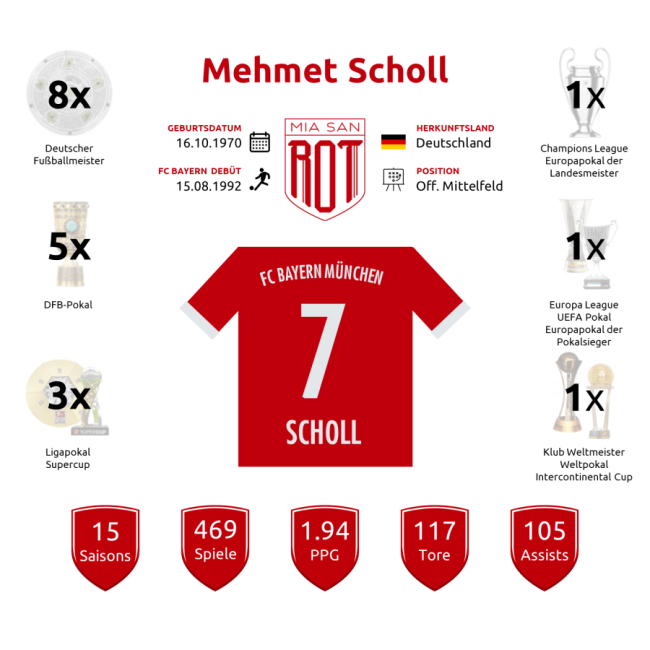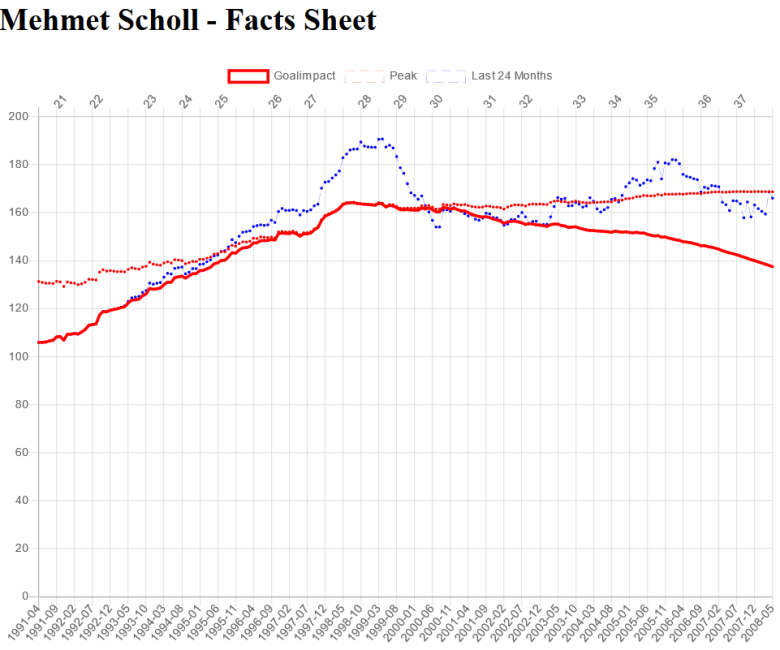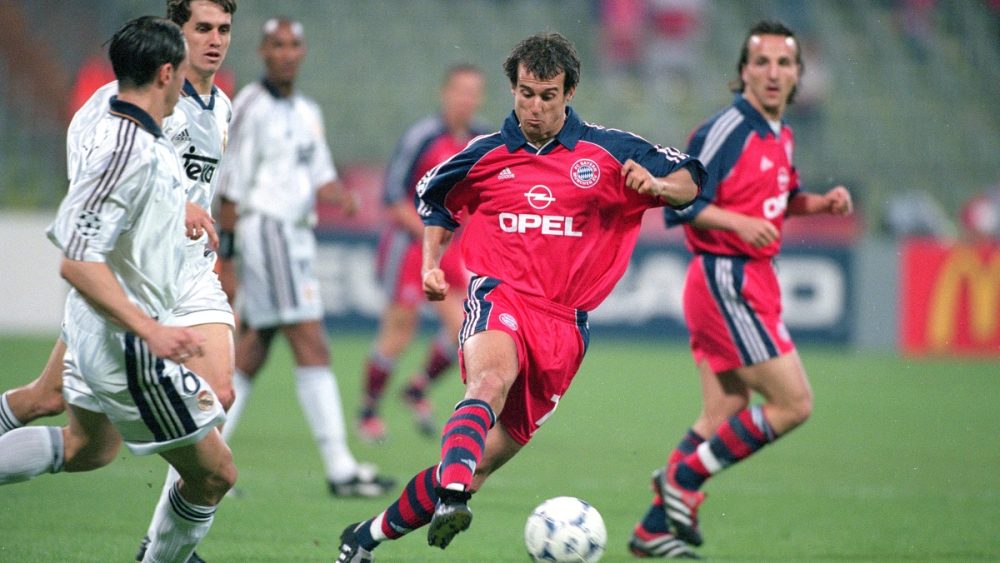FC Bayern – Miasanrot Advent Calendar, Door 7: Mehmet Scholl
An article about Mehmet Scholl by an author whose website is called laptoptrainer.de – that can’t be a good omen! However, anyone hoping for a review of Scholl’s famous Laptoptrainer criticism will be disappointed. Because before Scholl was a frequent guest as a TV pundit TV studio, he was one of the best German footballers of his time. That’s what this article is all about.
A guest article by Tobias Escher.
I had the privilege of being a young boy enthusiastic about football during the prime of Scholl’s football career. In our schoolyard, everyone wanted to be Scholl. Back then, he was a footballer who stood out from the pack. He dared to do tricks, left opponents stranded, provided the rare highlights in the Ran matchday analysis on TV. My look back is therefore somewhat nostalgic and blurred. The time is simply too long gone for an in-depth analysis. Nevertheless, I would like to dare to pay tribute to the footballer Scholl at this point.
Dribbler, artist and street footballer
Born in Karlsruhe, Mehmet Scholl was a street footballer through and through. He already showed first glimpses of his yet to evolve talent when he moved from Karlsruher SC to FC Bayern in the early nineties. In a time when man-to-man defence and fighting stood synonymously for good football, Scholl floated across the pitch with entrancing fleet-footed elegance. However, it took him some time at his new club to assert himself against the established old guns at Bayern. Uli Hoeneß convinced him not to give up after his first unsuccessful year in Munich. Scholl’s perseverance ultimately paid off. In the course of the nineties, he grew to become a key player in a Bayern team that won national and international titles.

Scholl was among the most gifted of dribblers. With his right foot he stacked up touches like collectors collect stamps. Scholl would be the perfect footballer for the 21st century: His tricks and feints would be clicked millions of times on YouTube. “Mehmet Scholl: Insane Skills!” The fact that these videos hardly exist is largely due to the poor picture quality of the extant video footage of the nineties. With short, quick turns and drops of the shoulder, he left his opponents stranded. His trademark move was a quick move of the ball from his right foot past the opponent on the left. Scholl mostly used his left foot only for standing.
In 2001, he had a fabulous year in his role of attacking midfielder. He mostly started on the right side, but didn’t take positional fidelity too seriously, frequently popping up all over the field. He scored five goals during the 2000/01 Champions League season, missing a penalty in the final, which was not a curse to haunt him for ages thanks to Munich’s eventual victory. Scholl wrote himself into the history books of football with the Champions League winning team.
Prolonged stardom through adaptability
Scholl benefited at Bayern from the fact that others did the dirty work. He wasn’t a complete slacker, but I can’t recall a game in his early career in which he took to defending with inspired enthusiasm. Most of the time he played on the right wing or as a half-forward, available for counter-attacks or quick one-two passes from his colleagues. The rather full work of marking was done by the players behind him, having his back.
His lack of defensive work probably put the brakes on his career in the national team. National coach Berti Vogts never really warmed to him, so he was denied a World Cup appearance.
Yet the numerous injuries Scholl suffered arguably slowed down his career much more. His body could not cope with the stresses and strains of professional sport. To what extent the rough football of the nineties played a role in his injury history I dare not say. Let’s put it this way: knocking an opponent of his feet with robust means if necessary wasn’t as frowned upon back then as it is today.

(Source: Goalimpact)
His numerous injuries forced him to reinvent himself after 2001. He featured in the starting eleven less and less, typically being brought on as a substitute. Most of the time he was used in the number eight or ten position. His strong technique allowed him to assert himself even in tight situations under pressure from opponents. His goal-scoring rate declined in his later days. But he transitioned successfully to a player who set up goals for his teammates or helped decide close games with a well placed corner or free kick.
The career after the career
Watching Scholl back then was a lot of fun. Even the kids who weren’t Bayern fans at the time wanted to play like Scholl. He was something like the first pop star of German football, which was not only due to his boyishly attractive looks but also to his cheeky manner. Scholl always had a witty and cheeky quip on his lips.
After his career, all doors were open to Scholl. He may now grumble about the new generation of laptop coaches who in his view have a too theoretically informed view of football and deprive former professionals like him of a seat on the coach’s bench. But any laptop coach would kill for the chance to coach FC Bayern’s second team. Scholl did so twice, but eventually opted for a career as a TV pundit.
Finally, I do have to comment on what I really didn’t want to comment on. My criticism of Scholl, the football expert, is not so much about the opinions he holds. I even share many of his views. The fact that too much emphasis is placed on rigid tactical concepts in German youth football does not suit Scholl, an instinctive footballer. He felt particularly comfortable when he could act freely on the pitch. Today, young footballers are rarely allowed to do that. So they lose important skills like improvisation, which Scholl had imbibed on the football pitch from early on.
What I find worrying is the form in which Scholl packages his criticisms. Not infrequently, this criticism is disrespectful towards people who do the hard coaching work that Scholl seemingly is too good for. He had his chance to remain a role model for my generation after his career. He has squandered this chance.
But that doesn’t diminish his achievements as a player. Even today, I enjoy watching Scholl’s great games; for example, the 1996 Uefa Cup semi-final against FC Barcelona or the 2001 Champions League quarter-final against Manchester United. Nobody can take that away from Scholl.





